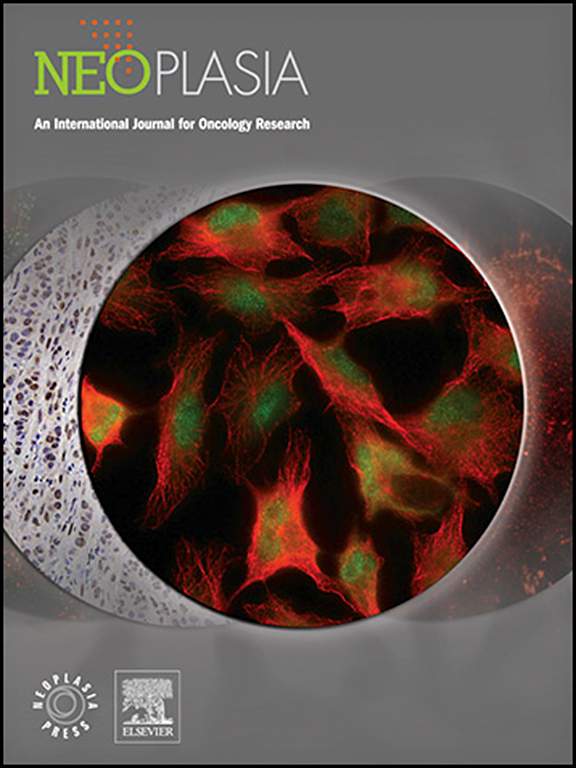SCFβ-TrCP targets Ajuba for degradation in a GSK3β-dependent manner in colorectal cancer
IF 7.7
2区 医学
Q1 Biochemistry, Genetics and Molecular Biology
引用次数: 0
Abstract
Ajuba (ajuba LIM protein, JUB) is a member of the Ajuba family, and its oncogenic biological functions in colorectal cancer (CRC) have been extensively reported including proliferation, metastasis and resistance to chemotherapy. Although considerable studies have reported the regulation of Ajuba at the transcriptional level, the potential mechanisms of regulating Ajuba protein stability have not been fully elucidated to date. Herein, we showed that the mRNA and protein expression of Ajuba is upregulated in CRC tissues, high protein level correlates with unfavorable prognosis. Importantly, we identified Ajuba as a novel substrate of GSK3β kinase and SCFβ-TrCP E3 ubiquitin ligase. Mechanistically, GSK3β phosphorylates Ajuba at serine 163 in the highly conserved degron motif (TS163GIS), which determines the interaction between Ajuba and the C-terminal WD40 domain of β-TrCP, and subsequent ubiquitination and targeted proteasomal degradation of Ajuba by β-TrCP. Conversely, the S163A mutant significantly attenuates the ubiquitination level of Ajuba. Overall, our study reveals a novel regulatory mechanism of Ajuba at post-translational level and sheds light on the role of GSK3β-β-TrCP axis in the turnover of Ajuba in CRC.
SCFβ-TrCP在结直肠癌中以gsk3 β依赖的方式靶向阿朱巴降解
Ajuba (Ajuba LIM protein, JUB)是Ajuba家族的一员,其在结直肠癌(CRC)中的致癌生物学功能包括增殖、转移和化疗耐药等已被广泛报道。尽管大量研究报道了在转录水平上对阿朱巴蛋白的调控,但迄今为止,调节阿朱巴蛋白稳定性的潜在机制尚未完全阐明。本研究发现,在结直肠癌组织中,Ajuba的mRNA和蛋白表达上调,蛋白水平高与预后不良相关。重要的是,我们发现Ajuba是GSK3β激酶和SCFβ-TrCP E3泛素连接酶的新型底物。从机制上讲,GSK3β磷酸化了阿朱巴高度保守的降解基序(TS163GIS)的163丝氨酸,这决定了阿朱巴与β-TrCP的c端WD40结构域的相互作用,以及随后β-TrCP对阿朱巴的泛素化和靶向蛋白酶体降解。相反,S163A突变体显著降低了Ajuba的泛素化水平。总之,我们的研究揭示了Ajuba在翻译后水平上的一种新的调控机制,并揭示了GSK3β-β-TrCP轴在大肠癌中Ajuba转换中的作用。
本文章由计算机程序翻译,如有差异,请以英文原文为准。
求助全文
约1分钟内获得全文
求助全文
来源期刊

Neoplasia
医学-肿瘤学
CiteScore
9.20
自引率
2.10%
发文量
82
审稿时长
26 days
期刊介绍:
Neoplasia publishes the results of novel investigations in all areas of oncology research. The title Neoplasia was chosen to convey the journal’s breadth, which encompasses the traditional disciplines of cancer research as well as emerging fields and interdisciplinary investigations. Neoplasia is interested in studies describing new molecular and genetic findings relating to the neoplastic phenotype and in laboratory and clinical studies demonstrating creative applications of advances in the basic sciences to risk assessment, prognostic indications, detection, diagnosis, and treatment. In addition to regular Research Reports, Neoplasia also publishes Reviews and Meeting Reports. Neoplasia is committed to ensuring a thorough, fair, and rapid review and publication schedule to further its mission of serving both the scientific and clinical communities by disseminating important data and ideas in cancer research.
 求助内容:
求助内容: 应助结果提醒方式:
应助结果提醒方式:


